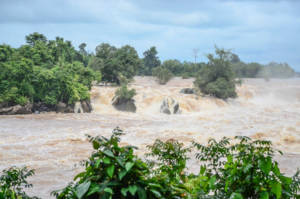 Did a great flood once cover our entire planet? Some creationists apply literal interpretations to the Genesis flood story. They point to various geological features and deluge myths all over the world as evidence backing their assertions. The scientific community at large dismisses these claims, but why do so many flood stories exist? Both science and folklore may hold the answers to this question.
Did a great flood once cover our entire planet? Some creationists apply literal interpretations to the Genesis flood story. They point to various geological features and deluge myths all over the world as evidence backing their assertions. The scientific community at large dismisses these claims, but why do so many flood stories exist? Both science and folklore may hold the answers to this question.
Flood Myths Around the World
Professor David R. Montgomery quickly mentions some deluge myths in an article for The Conversation. Tales from cultures around the Pacific Ocean describe catastrophic flooding from huge waves that suddenly rise from the sea. The Mapuche people of Chile tell of a tsunami caused by two giant snakes battling to see who could raise the waters higher. Yet stories in other parts of the world have slightly different details. Scandinavian myths depict Odin and his brothers slaying the frost giant Ymir, which unleashes a great flood upon the land. Time writer Ishaan Tharoor discusses Gilgamesh’s famous flood narrative, which may predate the Genesis version. In both tales, the deluge results from immense thunderstorms with lots of rain.
Most myths depict massive flooding that threatens humanity’s extinction. One notable exception, known as “Great Yu controls the waters,” comes from Chinese folklore. Repeated flooding impacted China’s lowlands for over two generations, forcing people from their homes. After years of failed attempts by his father Gun, Yu solves the problem by creating multiple channels that carry floodwaters to the sea. Thanks to his success, Yu becomes China’s emperor and founds its first dynasty.
Evidence for Global Flooding?
How old is our planet? The answer you’ll hear depends on who you ask. Radiometric dating of zircon crystals from Australia’s Jack Hills revealed that they’re 4.4 billion years old. However, Young Earth creationists insist that Earth is less than 10,000 years old. They derive their beliefs from both a literal interpretation of the Bible and the works of Anglican archbishop James Ussher, who claimed in 1650 that God created the earth in 2002 B.C.E.
Published in 1961, “The Genesis Flood” helped launch the modern creationism movement. It’s also an early example of flood geology, which attempts to prove the Genesis flood narrative with geological evidence. David R. Montgomery points out two of its ideological inconsistencies in another piece for The Conversation. Multilayered rock strata show many cycles of erosion, deposition, and burial. A single universal flood cannot explain these physical characteristics. The Genesis story also claims that Noah saved every living thing, but 99% of species found in the fossil record are extinct.
Geological Findings Point to Many Floods
If science doesn’t support the idea of a global flood, then what does it tell us? Geomythology examines the connections between folklore and natural events such as earthquakes and floods. In 2016, Chinese researchers found geological and archaeological evidence of catastrophic flooding in the country’s lowlands. The Washington Post’s Sarah Kaplan explains that this evidence dates the flooding to around 1900 B.C.E. This date closely matches the great flood myths and Emperor Yu’s lifetime.
Slate’s Andrew Lawler mentions archeologist Jennifer Pournelle’s discovery of significant climate changes in Mesopotamia about 6,000 years ago. Satellite images, geomorphological charts, and mud core samples revealed rapidly rising sea levels that covered vast expanses of land. Melting glaciers may have caused outburst flooding during prehistoric times, especially in areas like Northern Europe and the Mediterranean.
Reconciling Myth and Science
Humans are naturally attracted to mysteries. We’re curious beings who seek answers, so it is no surprise that flood myths invite speculation and investigation. While geology doesn’t prove the existence of a single worldwide deluge, it does reveal several smaller floods caused by changes in our climate. Geology also confirms that our myths contain some kernels of truth and the power of stories to preserve memory.


